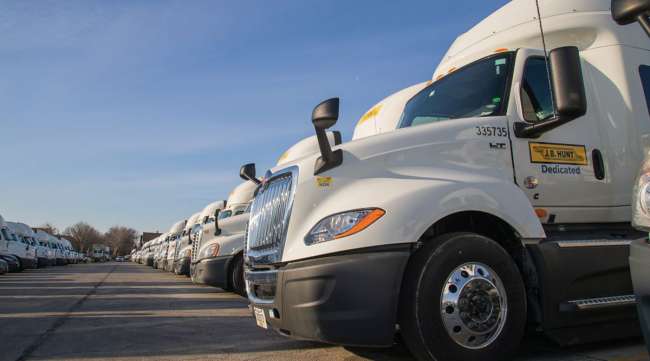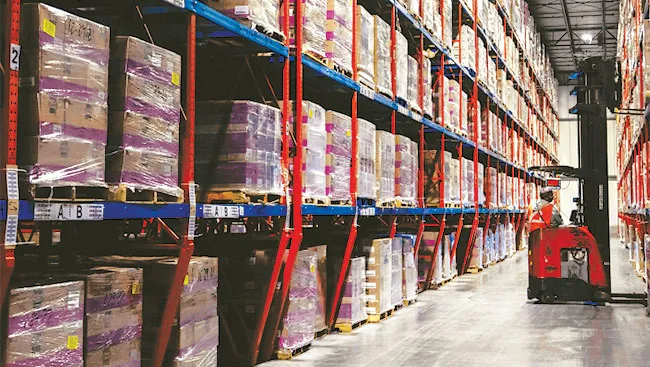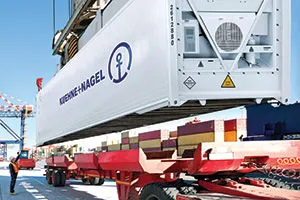Features Coordinator
Logistics Market Faces Challenges Across Segments in 2023

[Stay on top of transportation news: Get TTNews in your inbox.]
Freight Brokerage Firms
For the most part, large freight brokerage companies faced declining revenues and compressed margins last year as an oversupply of freight hauling capacity continued to hold down freight rates.
Despite this difficult business environment, familiar names continue to dominate the list of the largest freight brokers in North America.
C.H. Robinson Worldwide easily retained its top ranking even as gross revenue from its brokerage operations decreased to $12.5 billion in 2023, down from $15.8 billion a year earlier.
Total Quality Logistics remained No. 2 with revenue of $6.6 billion while WWEX Group, the parent of Worldwide Express, GlobalTranz and Unishippers, moved up one position to No. 3 with over $4 billion in brokerage revenue last year.
UPS business unit Coyote Logistics slipped to No. 4 on the list as revenue declined to $3.9 billion. Earlier this year, UPS said it was considering selling that business, which it acquired for $1.8 billion in 2015.
In September, J.B. Hunt, whose freight brokerage business ranks No. 11 on the list, purchased the brokerage operations of BNSF Logistics, which was No. 35 on the sector list a year ago.
— Seth Clevenger
Dry Storage Warehousing Firms
While freight brokers and forwarders dealt with lower revenues and tighter margins in 2023, warehousing providers encountered challenges of their own last year.
►Amazon Takes No. 1 Spot on Top 100 List
►When Will Freight Market Conditions Improve?
►Map: Where the Top 100 Are
►Armstrong: A Year to Forget for 3PLs
►Logistics Market Faces Challenges Across Segments
Sector Rankings
Freight Brokerage | Dedicated
Dry Storage Warehousing
Refrigerated Warehousing
Ocean Freight | Airfreight
Rising labor costs and inventory imbalances continued to put pressure on warehouse operators and contract logistics firms.
At the same time, consumers’ growing expectations for next- or same-day delivery for products ordered online have been raising the bar for e-commerce fulfillment providers.
To help address these challenges, some third-party logistics firms have been embracing warehouse automation. More companies are investing in the development and deployment of automated technology and robotics to cut costs and help make warehouse workers more efficient.
The most notable change to Transport Topics’ updated list of the largest dry storage warehousing firms is the addition of Amazon.com Inc. at the top of the list.
With its vast warehousing and e-commerce fulfillment network, Amazon uses its supply chain capabilities to support independent businesses selling their goods on Amazon.com and other sales channels.
Following Amazon on the dry storage warehousing list are the same five companies that made up last year’s top five. No. 2 DHL Supply Chain and No. 3 Ryder Supply Chain Solutions both expanded their warehousing networks last year, adding 13 million and 6 million square feet of space, respectively.
No. 4 GXO Logistics and No. 5 NFI round out the top five, with both companies maintaining at least 70 million square feet of dry storage space.
Refrigerated Warehousing Firms
The industry consolidation trend that has taken hold in the temperature-controlled warehousing sector in recent years continued in 2023 as Lineage Logistics and Americold Logistics remain unchallenged in the cold storage segment.
Lineage added to its count of refrigerated warehouses through its purchase of eight warehouses from food service redistribution firm Burris Logistics.
Burris previously ranked No. 4 on the refrigerated warehousing list but sold several assets in 2023 and is focusing its resources on its freight brokerage arm, Trinity Logistics.

Inside a Lineage Logistics cold storage warehouse. (Lineage Logistics)
Americold also expanded its temperature-controlled capacity in 2023, adding three warehouse locations.
Lineage and Americold have remained in the No. 1 and No. 2 positions on the list since 2019, when Lineage first overtook Americold for the industry’s most refrigerated warehousing space.
Dedicated Contract Carriers
As shippers look to enhance their supply chains and solve their logistics challenges, contracting a dedicated fleet to provide guaranteed trucking services has become an increasingly common approach.
To meet that growing demand, the largest dedicated carriers in North America continued to expand their fleets in 2023.
J.B. Hunt Dedicated Contract Services remains at the front of the pack, with the industry’s largest dedicated fleet at 13,252 power units.
Moving up one position to the No. 2 spot on the list is Ryder Supply Chain Solutions, which greatly expanded its dedicated fleet capacity with its $290 million acquisition of Cardinal Logistics, which ranked No. 9 on the dedicated sector list a year ago.
That transaction, which closed in February, added 200 locations, 2,900 power units and 3,400 drivers to Ryder’s dedicated fleet operations, the company said.
Penske Logistics, Schneider and Knight-Swift Transportation round out the top five, followed by Werner Enterprises and NFI Transportation.
Ocean Freight Forwarders
Inflationary pressures, lower consumer confidence and decreased demand all contributed to another down year for ocean freight forwarders in 2023.

A Kuehne + Nagel container being lowered onto a chassis. (Kuehne + Nagel)
Volumes declined for several of the largest ocean forwarders as shipping rates fluctuated throughout the year.
Kuehne + Nagel retained its No. 1 spot on Transport Topics’ list of the industry’s largest ocean freight forwarders despite forwarding 48,000 fewer 20-foot-equivalent units than in 2022.
The rest of the top five also remained unchanged from a year ago, although only one grew its ocean forwarding business. No. 2 Sinotrans forwarded 419,000 more TEUs in 2023 than the prior year.
Airfreight Forwarders
Most of the industry’s largest international freight forwarders faced significant declines in airfreight volumes last year as demand continued to weaken.
Eight of the top 10 companies on Transport Topics’ updated sector list forwarded less airfreight in 2023 compared with the prior year.
Kuehne + Nagel and DHL Supply Chain & Global Forwarding retained their positions as No. 1 and No. 2 on the list despite seeing their airfreight volumes decrease by 249,000 and 230,000 metric tons, respectively.
Some forwarders, however, managed to expand their business in 2023. Firms that saw significant growth in airfreight include No. 5 Sinotrans Ltd., which forwarded 121,000 metric tons more than in 2022, and No. 9 AWOT Global Logistics Group, which moved into the top 10 thanks to a volume increase of 95,000 metric tons.
Want more news? Listen to today's daily briefing below or go here for more info:





